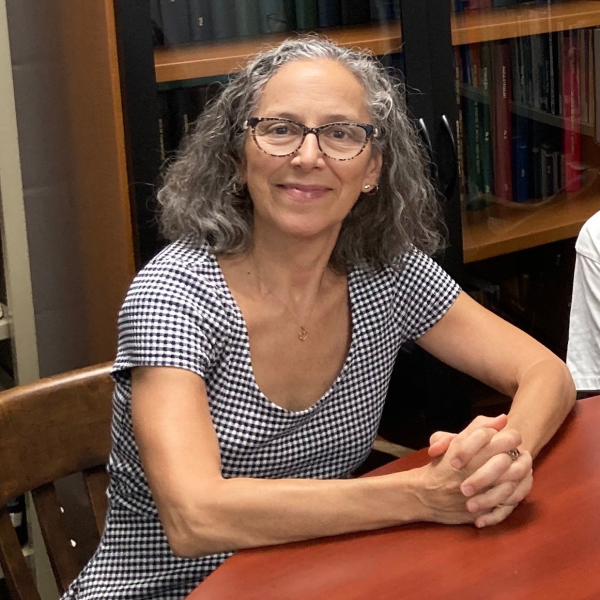“I have no idea exactly what I’m getting into, but it will be fun," says Professor Sali Tagliamonte about her appointment as acting principal of University College from July 1, 2024 to June 30, 2025. “I think it will be a great experience for a year.”
Tagliamonte, a sociolinguist and former chair of the Department of Linguistics, first heard about the opening from UC Principal Markus Stock and decided to apply. She will be returning from a year of research leave after finishing her term as chair, and a new challenge appeals to her.
“What I loved about being chair was the people, especially the support of the other chairs and the collegiality,” Tagliamonte says. “Markus [Stock] tells me that principals have the same kind of connection.”
She enjoys the feel of U of T’s colleges and finds it refreshing to be around the students. “I like the ethos of UC with its inclusiveness, appreciation of diversity, and belief in representation for all different groups.”
Tagliamonte grew up in a mining town in northeastern Quebec. The majority of residents were French Canadians, but there was also a diverse group of people drawn to the town by the mine. She noticed the various ways each of these distinct cultures used language, not realizing that these youthful observations were setting the stage for her career.
In the summers, she visited her mother’s family in a small, rural farming community in Southern Ontario, where residents spoke with the accents of their British ancestors, so unlike the Quebec mining town.
“This was a world of regularized past participles, double negation, all kinds of variation in vowels and diphthongs and strange words and expressions,” Tagliamonte wrote in the introduction to her 2012 textbook, Variationist Sociolinguistics. “Little did I know of all that then! At the time, I only listened and marveled at how different they sounded.”
In fact, Tagliamonte knew nothing about linguistics as a teen and didn’t realize it was a career possibility. She originally went to university to study English with plans to become a poet. Instead, she discovered linguistics and fell in love with the field.
“I was born with the ‘antennae’ for language and with that natural penchant, one is drawn to words and expressions,” she has written in summarizing her career. “I think it’s almost like you do not discover sociolinguistics; it emerges in you.” Since that emergence, “I haven’t looked back,” she says, “but sadly, I haven’t been able to write poetry as well since. Linguistics has turned me more scientific. Perhaps the experiences I have at UC will bring that part of me back to life.”
Sociolinguistics is the study of language and society and how they intersect, she explains. Language can reflect social structure, membership in different groups in society, and cultural or geographic origins. Tagliamonte is particularly interested in this variability in language, and her field of specialization is variationist sociolinguistics.
“For me, as a scientist of language, variation in language is what gives me a tool to understand what is going on in society.”
In a 2016 piece written for Babel magazine, she noted, “A compelling attribute of variation linguistics as a field is that it is so tied up with life. Linguistic variation matters. People are judged by the way they talk and it often has serious economic and psychological repercussions.”
“We have different ways of saying the same things,” Tagliamonte says. “People say bud-er or but-ah or bu-eh but it is still just ‘butter’. These variations can reflect different social groups in society or reflect a changing language. Shakespeare, for example, lived in the 1500s and people used language very differently then, for example, saying, ‘doth’ rather than ‘does’.
“You can get a good reading on a community or society by exploring its systematic use of language. In Canada, you can’t really tell what social class people are from by their speech, but you can guess their education or the places they have lived from their vocabulary. That’s what’s fascinating about my work. Language and the way we use it tells a lot about us as a person, our ancestry, where we came from and where we’ve been.”
Her research reflects a curiosity about these variations and attempts to document some of them. She leads the Sociolinguistics/Language Variation and Change Lab at U of T and she and her students, both graduate and undergraduate, have been busy documenting Canadian English (2002 to the present) and Ontario dialects (2010 to the present). She has also explored and published on such topics as “cool” adjectives, old verbs, words like “bush” and “supper,” and what North American dialects can tell us about swear words.
While serving as acting principal, Tagliamonte hopes to find time to keep her research moving forward, possibly working on it one day each week. She will have help from a post-doctoral fellow, while her lab manager will keep the lab running smoothly.
Meanwhile, she’ll be busy learning the ins and outs of the college, meeting the UC community, and “maintaining Markus’ commitment to the College and the work he has set in motion, especially the push toward making contact with alumni. “I’m friendly and a people person. I like talking to people and hearing different ideas.”
Stock is pleased to have Tagliamonte on board while he takes a research leave. “I am delighted that Professor Tagliamonte has agreed to take on this role in my absence,” he says. “She is a stellar scholar and researcher of North American sociolects and holds the Canada Research Chair in Language Variation and Change. As former chair of the Faculty of Arts and Science’s Department of Linguistics, she is a seasoned and experienced administrator. UC will be in the best of hands.”
Elaine Smith is a freelance writer, editor, and project manager based in Toronto.
